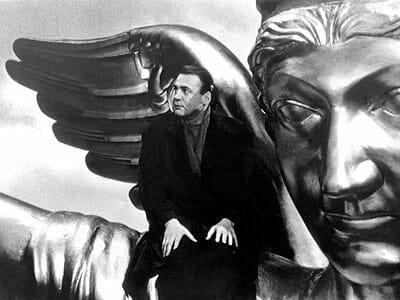
DVD Release Date: Nov. 3
Director: Wim Wenders
Writers: Wenders, Peter Handke
Cinematographer: Henri Alekan
Starring: Bruno Ganz, Otto Sander, Peter Falk, Solveig Dommartin
Studio/Run Time: Criterion, 127 mins.
Wim Wenders’ masterpiece illuminates the sublime in everyday existence
In this 1987 Wim Wenders classic (finally getting the Criterion treatment this month), two angels, Damiel and Cassiel, watch over a divided Berlin. Sometimes they observe from lofty perches, but mostly they move freely through the ordinary lives of the city’s inhabitants, observing and documenting what they see. Occasionally, an angel will put an intangible arm around someone to offer subtle comfort.
One morning, Damiel and Cassiel sit in a BMW on a showroom floor, recalling the previous day. They recount events big and small—mostly small: the sunrise at 7:22, a pedestrian drenching himself while folding his umbrella, a child who stops blinking while listening to an old man read The Odyssey. Later, standing by the Berlin Wall, they recall the primordial waters and the tanks of World War II.
All of this witnessing is enthralling but still leaves them wanting. Damiel tells his friend, “It’s great to live by the spirit … but sometimes I’m fed up with my spiritual existence.” He wants something to tie him to the earth, to time and space. “To sit at the empty place at a card table and be greeted, even by a nod. … It would be rather nice, coming home after a long day to feed the cat, like Philip Marlowe. To have a fever, and blackened fingers from the newspaper. At last to guess, instead of always knowing.”
Watching a trapeze artist, Damiel falls in love and returns to observe her day after day, strengthening his desire for incarnation. Eventually, he gets his wish and their love is requited.
This love affair dominates most synopses of the film—and drove its loose remake, City of Angels (starring Nicolas Cage and Meg Ryan). Wenders’ vision, however, is notably free of Wagnerian bombast, Shakespearean tragedy and Austenian romance. And it’s largely free of plot. We move from character to character at a gentle, languorous pace, eavesdropping on internal monologues. There is no rush to the love affair, no hurry to become human, no need to go anywhere. We’re simply observing humanity.
The film moves with a tension of opposites—not a dualistic, competitive tension, but one that seeks balance and synthesis, and that recognizes that one aspect completes the other. Foremost is the tension between spirit and flesh. Society usually elevates one above the other, tending toward hedonism or Gnosticism, but Wenders suggests life is fullest in their union. The angels love their ethereal existence and notice the spiritual longing of humanity. But they, in turn, need the material world to complete themselves. Approached with a spiritual openness, there’s profound joy in the embrace of a soulmate or a simple cup of coffee.
Then there’s the tension between childhood and adulthood. The story begins with a narrator writing “The Song of Childhood,” a poem that appears in variations throughout the film. “When the child was a child, it walked with its arms swinging. … Everything was full of life and all life was one.” Children are uninhibited and open. They ask simple but profound questions, “Why am I me and why not you?” Adults are too self-conscious and self-occupied. Nonetheless, amidst their jumble of thoughts, they return to these basic questions. Their lives are punctuated by moments of joyful abandonment. After Damiel becomes human, he recites “The Song of Childhood” but adds, “and it still does” to each stanza. Adulthood finds completion in childlike wonder.
Finally, there’s the tension between high-brow and low-brow, between the lofty and the mundane. Life’s minutiae are juxtaposed with its grand questions, giving equal consideration and substance to both. An operatic score and the majestic cityscapes mix seamlessly with rock clubs featuring Nick Cave and the Bad Seeds. Life moves at the same pace, and both are settings for contemplation.
The language itself lives in tension. The angels speak poetically, and the people’s thought monologues are ponderous, if not poetic (with both sets of lines written by German playwright Peter Handke). But then Peter Falk, playing himself, improvises his lines and brings a plainspoken levity to the film. He also brings a sense of peacefulness and a steady, reassuring presence. He exemplifies the balance being sought—simple but profound, a spirit fully enjoying the flesh with both childlike exuberance and adult responsibility.
Wings of Desire is a masterful work that’s part tone poem, part philosophical treatise and part love story—not a dramatic tale of love writ large, but an exploration of the tiny things that can make life worth loving. This story of angels is really an examination of what it means to be human—in the most profound sense but via the smallest, most trivial details. As it turns out, there’s a lot more than the devil in those details.